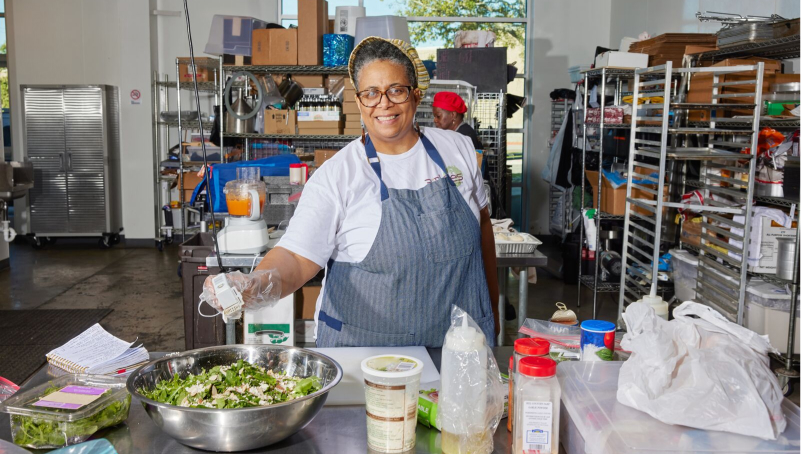Who needs a Texas food handlers license?
To meet local health jurisdiction requirements, all of your employees who work with food, food equipment, utensils or food-contact surfaces must get a food handlers certificate.
This includes hosts, servers, bussers, on-site event coordinators, kitchen staff, bartenders and other employees at food service businesses. They have 30 days from their start date to obtain the certification, according to the Texas Department of State Health Services (DSHS).
One notable exception to the Texas food handling license requirement is the Certified Food Manager (CFM). DSHS has a separate food manager training program for CFMs, who also act as supervisors for the business’s food handlers.
Your business may need at least one CFM or trained food manager onsite at all times, depending on your local ordinances. You’ll need to get this certification if you don’t have any employees.
Besides CFMs, a few other individuals are also exempt from Texas food handling certificate requirements:
- Employees that only serve pre-packaged items.
- People who help with activities of daily living, such as nurse assistants, nurses, etc.
- People who distribute pre-portioned food items in settings like classrooms or daycares.
- Volunteers who work with food but are not employees of the business.
In addition to complying with Texas law, employing certified food handlers helps to protect your business. This process ensures that your employees are trained in proper food preparation and handling techniques, which reduces the risk of foodborne illness.
How to get a food handlers license in Texas
To get a Texas food handler certificate, you must first complete an accredited food handling training course. You’ll also need to pass an exam approved by the American National Standards Institute (ANSI) or the Department of State Health Services.
Your employee will learn a variety of topics about proper food handling. Courses include training on:
- Foodborne illness.
- Personal hygiene.
- Time and temperature requirements.
- Cross contamination prevention.
- Cleaning and sanitizing.
After completing a course for food handler certification, Texas workers receive a food handler card in person, electronically or by mail. It’s your responsibility as the employer to keep an electronic or hard copy of every employee’s certification onsite.
Each card must list the food handler program name and address and either a DSHS Accreditation License Number or ANSI number. If you need to verify an employee’s food handler certification, contact the program they used to get their card.
How much is a food handlers license in Texas?
Texas food handler courses can be completed entirely online through an accredited program. In-person courses are also available in many cities across Texas. Typically, a course costs range from $10 to $20.
While some employers choose to cover the certification cost for their employees, it is not required. The license is the property of the employee, and they can take it with them to a new employer if they change jobs.
How long does it take to get a food handlers license in Texas?
Getting a food handler license in Texas doesn’t take long. Employees can complete the certification course in just two hours.
Workers become certified food handlers as soon as the course is successfully completed. Courses are available on demand through numerous online training programs, and many offer an option to print the certificate instantly.
How long is a food handlers card good for in Texas?
Texas food handler certificates are valid for two years from the date they were issued. To renew the certification, you or your employees must retake the course, pass the test and receive a new card.
Food handler cards issued by an accredited program in Texas are recognized statewide. If food handler cards are issued from a program outside of Texas, they will be recognized if they are from an ANSI-accredited program.
Insurance for Texas restaurants, caterers, cafes and food service businesses
The right Texas business insurance can help protect against different types of risks you face every day. Many Texas businesses consider a combination of:
General liability insurance
Texas general liability insurance can protect your business if you are held responsible for accidents that result in property damage or injury to someone other than you or an employee.
If you opt for food service general liability insurance, your policy can also include foodborne illness coverage. Without it, you could be liable for expenses if customers get sick from contaminated or improperly prepared food.
Workers’ compensation insurance
Although Texas law doesn’t require it for every business, workers’ compensation insurance can be a huge help for coverage for workplace injuries. Businesses without coverage could be held responsible for expenses if an employee gets hurt on the job.
Commercial property insurance
Commercial property insurance can help protect physical business assets, such as equipment, inventory, furniture and buildings. A policy can cover the cost of repairs or replacements in the event of damage from covered events, such as a fire or water damage from a burst pipe.
Commercial auto insurance
Commercial auto insurance can help cover medical expenses, property damage and other related costs if you or an employee are involved in an accident while driving a work vehicle.
The Texas Department of Insurance mandates minimum auto insurance coverage. Your policy must have bodily injury coverage of $30,000 per person ($60,000 per accident) and $25,000 for property damage.
How NEXT helps support Texas restaurants, cafes, caterers and food service
NEXT has tailored Texas restaurant insurance designed for small businesses and self-employed business owners.
In about 10 minutes, you can get a quote, see rates and coverage options, choose your policies and download a certificate of insurance.
And if you have questions along the way, our team of licensed insurance advisors is standing by, ready to help.
Start a free quote with NEXT.





